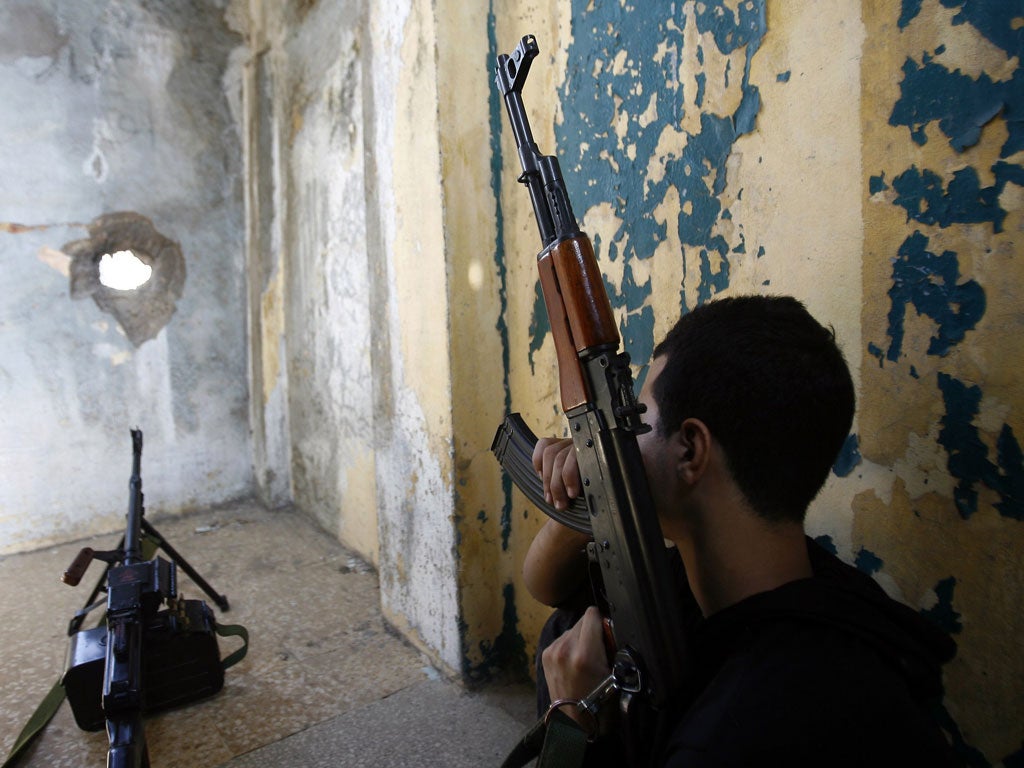Hezbollah crosses Syrian border with bloody assault on Assad's enemies
Special report: Shia fighters coming to the regime's aid have tipped the balance of power. Loveday Morris meets beleaguered rebels taking sanctuary a few kilometres from the border

It is a fortnight since Amr Al Ali was smuggled unconscious over the border to Lebanon, with a graze to his lips from a ricocheting bullet and deep wounds in his legs and hands after an exploding rocket turned a breeze-block wall in front of him into concrete shrapnel.
Yet the Free Syrian Army fighter says his enemy was not President Bashar al-Assad's soldiers, but militants from the armed wing of the Shia movement Hezbollah, a long-standing ally of Iran and the Syrian regime.
Rebel fighters and fleeing residents have told The Independent that Hezbollah began a major assault on the Syrian side of the border in mid-October, after the FSA tried but failed to take control of border villages and crossing points. At night Katyusha rockets fired from Hezbollah positions in the Hermel area rain down on rebel positions over the border, they claim.
"Everyone knows they have fighters there," said the bearded 23-year-old Syrian, from the temporary sanctuary of an old agricultural outbuilding perched over the Lebanese town of Aarsal, a few kilometres from the border. However, he said the situation had changed in recent weeks as even more militants began to flow in.
Evidence shows that Hezbollah is sending ever more fighters across the border to back the Syrian regime. Its supporters have thronged to the Bekaa valley for funerals of militants – including that of a senior commander whom Hezbollah said died on "jihadist duties", without specifying where.
The movement's increased involvement threatens to further destabilise Lebanon, which is already reeling from the assassination of Wissam al-Hassan, a top intelligence chief, a week ago. Many speculate that the Syrian regime or its proxies were behind the killing.
The recent bout of fighting has, according to residents and fighters, focused on the small, largely Sunni border town of Jousiya, its surrounding villages, and crossing and supply routes for arms and fighters to the cities of Al Qusayr and Homs.
An attempt by rebels to take key positions along the Syrian side of the border – where many villages are Shia and support Hezbollah – led the regime to call in reinforcements from the group, according to one FSA commander who returned to his home in Lebanon from the battles last week. "The objective was to take control of military posts on the border and the Jousiya crossing," said Omar Sheikh Ali, from his well-furnished home in the Bekaa valley, where he is registered as a refugee. "However, we believe there was a leak of information from within the FSA and the regime asked Hezbollah for help. They were ready for us."
Rebels say that Hezbollah reinforcements and the use of helicopters, air power and rockets have tipped the balance of power.
"At night Hezbollah fire rockets at us from the Lebanese side, and we have the Syrian army on the other side," says Hasna Al Mohammed, a 24-year-old who fled the village of Nasriya two weeks ago. "We are squeezed."
Most of Jousiya fell back into regime hands last Wednesday, after so-called "barrel bombs" – oil drums packed with TNT and shrapnel – were dropped from helicopters, according to fighters. Wafic Khalaf, a member of the municipal council in Aarsal, claims that 300 families from Jousiya are now sheltering in his town.
Amr Al Ali was fighting in the village of Zahraa, on the outskirts of Jousiya. "Initially we had the upper hand," he said. "But recently Hezbollah have come in with thousands of soldiers because the Syrian army couldn't fight us alone."
The young fighter claims he recognised his enemies as Hezbollah by their combat skills and American-made M16 assault rifles. But Sheikh Ali says the situation is far from clear cut. "They are mixed with the soldiers," he said. "We can't tell exactly how many there are, but our proof is those who come back to the Bekaa in a coffin or those we capture."
The FSA claimed to have captured 13 Hezbollah fighters in Syrian territory, and threatened to take revenge by striking the movement's stronghold in the southern suburbs of Beirut if its forces are not pulled from battle.
Hassan Nasrallah, Hezbollah's leader, denies sending fighters but says that many Shia residents of Lebanese border towns who support Hezbollah have picked up arms to defend themselves after coming under attack from Syrian rebels. As the Syrian civil war disintegrates into a sectarian conflict waged by regional proxies, just how vulnerable Lebanon is to the chaos sweeping over its border is starkly evident in the towns and villages of the Bekaa valley, where Sunni enclaves sympathetic to the revolution pepper the Shia Hezbollah heartland.
If Aarsal is home to returning FSA fighters, refugees and arms dealers, then the neighbouring village of Labwe is a Shia stronghold where Hezbollah flags and pictures of Hassan Nasrallah line the streets."The blood will spill here," says Sheikh Ali. "It's only a matter of time."
Subscribe to Independent Premium to bookmark this article
Want to bookmark your favourite articles and stories to read or reference later? Start your Independent Premium subscription today.

Join our commenting forum
Join thought-provoking conversations, follow other Independent readers and see their replies